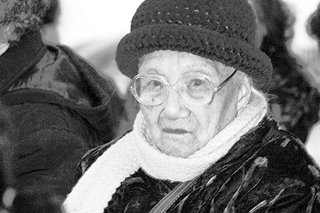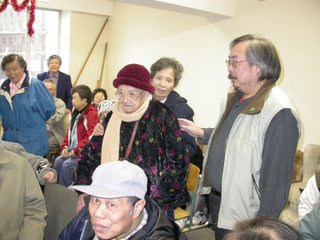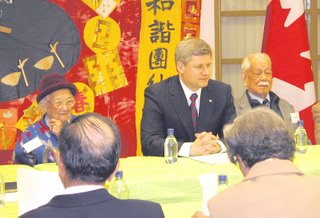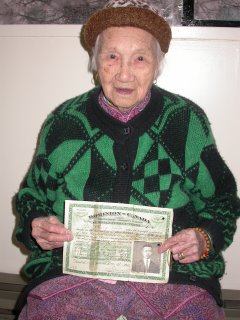Vancouver Sun: Where Harper Falls Short – article about failed promises
Octogenarian Gim Wong thinks that Prime Minister Harper should give cheques to the families of
each of the more than
80,000 Chinese head tax certificates… even if their original head tax
payers and spouses died before the Conservative promise was made. –
photo Todd Wong
Peter
O'Neil's article is aimed primarily at how the Harper governent has not
addressed the party's election promises. In particular, the
article also focusses on the ethnic issues of Chinese head tax, First
Nations fisheries and Air India inquiry, as well as leaky condos and
BC's under-representation in Parliament.
Octogenarian WW2 veteran Gim Wong is quoted as saying that the “Harper government's apology and redress package involving
$20,000 cheques which went to surviving head tax
payers or their surviving widows of payers, was a 'huge'
breakthrough.”
“But that's just the first step,” he said, stressing that $20,000
cheques should go to the families of each of the more than 80,000
Chinese immigrants who paid the charge imposed between 1885 and 1923.
Gim
should know. Gim has been a staunch advocate for head tax apology
and repayment, and was there to witness his friend Charlie Quon receive
the very first head tax ex-gratia payment from Canadian Heritage
Minister Bev Oda. But Gim will not receive a payment for his
father's head tax certificate, because both his parent's are
predeceased, even though Gim had to live through the enduring hardship
while his father worked hard to repay money borrowed to pay the $500
head tax, prior to 1923.
Sid Tan who accompanied Gim on his first
motorcycle “Ride for Redress” to Craiglelachie, BC, site of “the
last spike.” has written the following letter to the Vancouver Sun,
stating that Harper's promise to reconcile the head tax issue is still
unfinished.
Where Harper Falls Short.
Harper fulfilled the promise: “Apologize and provide financial redress
for victims of racist Canadian laws aimed at Chinese immigrants.”
financial redress to 0.6 of one percent of over 82,000 head tax
families. That would be ex gratia payments of $20,000 to approximately
500 surviving head tax payers and spouses of deceased head tax payers.
payers were also victims of government legislation (1885-1947) to
financially punish and separate Chinese families. Many of them excluded
by the government's unilaterally imposed so-called settlement continue
to seek justice and honour for pioneer families.
this matter by garnering photo-ops and pandering for votes. While not
exactly promise broken, their appalling message to the excluded
families is, “We were wrong. We are sorry. We will keep the money. Too
bad your father and mother didn't live long enough. Take it or leave
it.”
four thousand and growing represented by our Society, the Chinese
Canadian National Council and redress seeking groups from coast to
coast to coast. We say it ain't over until we say it's over. We say it
ain't over.
movement to outlast the Harper government and those following should a
just and honourable redress not be forthcoming. We are seeking what any
Canadian would want – refund of an unjust tax.
recognize all head tax families are equal and begin good faith
negotiations with their representatives.
Here is the Vancouver Sun article below:
Where Harper Falls Short
Unfilled election campaign commitments aimed at B.C.:
Boosting parliamentary representation, ending racially divided fisheries, leaky
condo probe
|
|
|
Peter O'Neil |
|
Vancouver Su |
Saturday, March 24, 2007
OTTAWA – The
spirits of British Columbians Leslie Budden, Carmen Maretic, Perviz Madon and Gim Wong rose in 2006 when
a newly-elected Conservative government took power armed with an unusually
robust series of B.C.-focused campaign commitments.
The
four British Columbians had long advocated for action on issues that might have
best been directed to the Apostle Jude, Christianity's patron saint of lost
causes: B.C.'s $1.5 billion leaky condo crisis; the Chinese head tax redress
issue; the quest for truth if not justice in the 1985 Air India terror
bombings; the so-called “race-based” rights controversy in fishing
communities.
All
were files that had languished for years if not decades.
Today,
as Prime Minister Stephen Harper prepares for a possible spring election, he is
facing a reckoning over the dramatic pledges that surprised many political
observers when they were delivered on a sleepy Saturday morning in
Victoria during the 2006
campaign.
Harper,
anxious to secure a B.C. political breakthrough he felt crucial to winning
government, took a calculated gamble that not only copied a successful B.C.
Liberal strategy from the 2004 election campaign — but drastically increased
the stakes.
While
the Liberals scored political points with a platform-style “Made in
B.C.” campaign in the 2004 election, Paul Martin's promises for the West
Coast were for the most part dominated by political platitudes.
Armed
with policy ideas from close to two dozen MPs who had spent years cooling their
heels in opposition, Harper produced an almost breathtaking “Stand Up For B.C.” platform with far more dramatic pledges than
Liberals or New Democrats pondered.
Only
Quebec , which
unlike B.C. rewarded Harper with more seats rather than fewer, warranted its
own region-specific agenda.
He
moved quickly on many, striking an Air India judicial inquiry, cancelling the
controversial Liberal privatization of a strategic port facility in
Prince Rupert , and
providing an apology and compensation to surviving head taxpayers or the widows
of those victimized by the racist tariff put on Chinese immigrants before 1923.
But
Harper has thus far fallen short on some of the more daring commitments,
including the pledge to boost B.C.'s representation in Parliament, his
post-election vow to end the policy of “racially-divided” fisheries,
and his promise to hold an inquiry into possible federal culpability in the
leaky condo crisis.
Maretic, an advocate for leaky condo
owners, has prepared a tough letter after shedding tears here last month while
meeting with Human Resources Minister Monte Solberg, who is responsible for the
Canada Mortgage and Housing Corp.
She
was frustrated that the Tory government, despite promising an inquiry, followed
the position of previous Liberal governments by saying it could say or do
nothing that might imply culpability. The government is facing several lawsuits
in B.C. courts.
“You
are aware of the toll this has taken particularly on our most vulnerable
citizens — single parents, young families, low income earners, disabled people
and seniors,” she wrote in a letter provided to The Vancouver Sun.
“The
outstanding question is whether your government will call the promised review
or state frankly that it has no intention to do so before an election is
called.”
Budden, 41, also fights back tears as she
voices frustration over the Harper government's refusal to shift gears from the
approach taken by successive governments since 1992 allowing separate,
native-only commercial fishing openings.
A
member of the Steveston fishing community, she has
struggled to make a living in the industry with her fisherman husband Glenn.
But
the issue goes deeper. Both her parents were Japanese-Canadians interned during
the Second World War. Her grandfather, Rintaro
Hayashi, was a Japanese-Canadian fisherman who fought against federal laws in
the mid-1920s that sought to reduce the number of “oriental”
fishermen.
One
law allowed only whites and aboriginal Canadians to use motorboats.
The
Conservative party was committed during the 2004 election to “equality of
all Canadians” in the commercial fisheries. While nothing was promised by
Harper in the 2006 campaign, he sent a letter to a
Calgary newspaper after the election
declaring that his government would oppose the “racially divided”
West Coast fishery.
“When
that statement came out I was ecstatic, I thought it meant they were actually
going to hold true to their word,” Budden
recalled this week.
“I
sent a letter saying how much it meant to us as a family. We thought they were
going to be different.
“Of
course, it hasn't turned out that way.”
The
Tory government, despite public statements saying Harper meant what he said,
has gone on to initial several treaties entrenching exclusive aboriginal
fishing rights. Indian Affairs Minister Jim Prentice has since defended the
government's policy as consistent with the Harper declaration, although Budden isn't buying it.
She
said her late grandfather is probably “rolling in his grave” at the
government's position.
“I
just really believe in my heart that we've failed him, failed what he fought
for and stood for.”
While
the Tory government has fulfilled many of the commitments, by striking an Air
India Inquiry and compensating Chinese head taxpayers, other unfulfilled
commitments hang like a heavy cloud over the government as it contemplates a
possible spring election.
They
include the pledge to end B.C.'s under-representation in Parliament, the
promise to strike a judicial inquiries into the
Fraser River
fishery, and the commitment to probe possible federal culpability in B.C.'s
$1.5-billion leaky condo crisis.
Both
Madon, whose husband died in the Air India bombing,
and Wong, whose parents paid the head tax, advocated less complex and divisive
issues that made it higher up on the Tory priority list.
Madon said she appreciates the launching
of the judicial inquiry, although she said family members deserve at least as
much credit as politicians for pushing the matter.
Wong,
84, is more effusive, saying that Harper and his lead MP on the redress issue,
Multiculturalism Minister Jason Kenney, showed far more respect for the
community than their predecessors. Wong should know. In 2005 he put on his old
air force uniform from the Second World War and rode his Honda Goldwing motorcycle from Victoria
to Ottawa to
push the redress case.
But
he couldn't get closer than a few metres from
then-prime minister Paul Martin before being “pounced” on by RCMP
security.
Wong
said Thursday the Harper government's apology and redress package involving
$20,000 cheques which went to surviving head tax
payers or their surviving widows of payers, was a “huge”
breakthrough.
“But
that's just the first step,” he said, stressing that $20,000 cheques should go to the families of each of the more than
80,000 Chinese immigrants who paid the charge imposed between 1885 and 1923.
Those
four issues were far from the only ones sure to be brought back under the
spotlight if the minority government falls and an election is triggered.
poneil@png.canwest.com
CHECKLIST
OF KEY B.C. PROMISES:
FULFILLED
–
Appoint an independent judicial inquiry into the Air India bombing of June 23,
1985.
–
Freeze the sale of the Ridley Island Coal Terminal in
Prince Rupert .
–
Apologize and provide financial redress for victims of racist Canadian laws
aimed at Chinese immigrants.
(note:
Only surviving headtax payers and spouses were offereded ex-gratia
payments, meaning only 0.05% of 81,000 head tax certificates were being
honoured. The sons, daughters and grandchildren of pre-deceased
head tax payers are being purposefully ignored and excluded. – Todd
Wong )
–
Offer financial help to Victoria
to stop dumping raw sewage into the Juan de Fuca Strait.
–
“Protect” B.C.'s softwood lumber industry, a commitment which led to
a controversial settlement of the longstanding trade dispute with the
U.S.
–
Invest $100 million a year for 10 years in the fight against the pine beetle
epidemic in B.C. forests. (That money was committed in the 2006 budget, though
Harper acknowledged Wednesday that the money has been slow in getting to B.C.
projects.)
–
Deliver at least the five-year federal funding commitment of $591 million for
the Pacific Gateway Initiative. The government has committed $1 billion over
eight years.
NOT
FULFILLED YET
–
Initiate an independent judicial inquiry into the collapse of the sockeye
salmon stocks on the Fraser
River .
–
Establish a regular army presence in B.C.
–
Review CMHC's handling of construction regulations
and leaky condos. Harper said during the campaign that he'd consider
compensation if the review proved federal responsibility for the widespread
moisture damage caused by flawed construction. Tory MP John Cummins, who helped
convince Harper to include the promise, has uncovered internal documents
suggesting the condo crisis was caused by federal National Building Code
regulations of the late 1970s and early 1980s.
–
Give British Columbia
additional seats to achieve fair representation in the House of Commons and
give the province “more equitable representation in the Senate.”
Harper
hasn't taken any steps to accelerate the next redistribution of seats in the House,
which is expected in 2014, and has actually opposed a bid by two senators to
pass a motion calling for more Senate seats for Western
Canada .
–
Require mandatory prison sentences for convicted operators of marijuana growing
operations and crystal meth labs. (The government has
delayed the legislation due to resistance from opposition parties, but has
promised a bill on the matter this spring.)
© The
Vancouver Sun 2007






